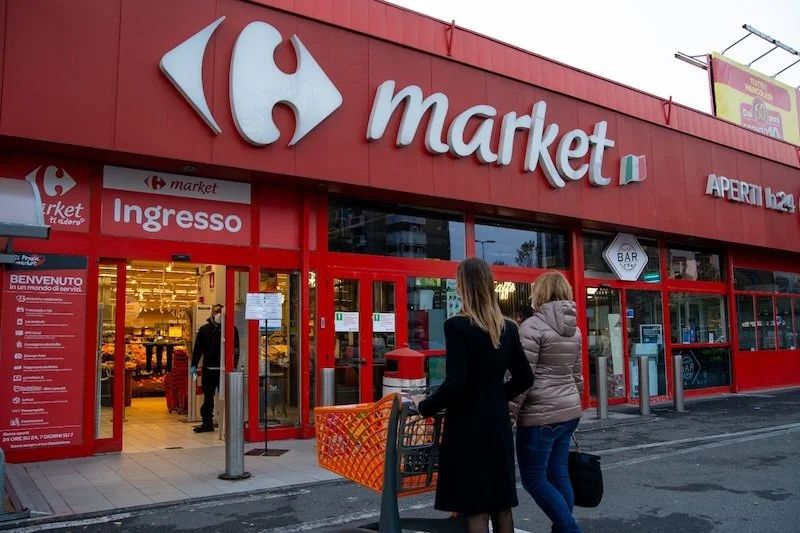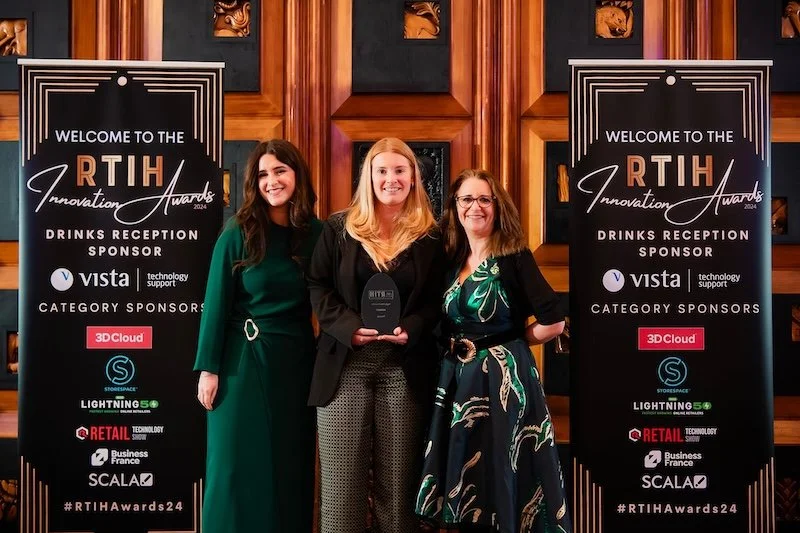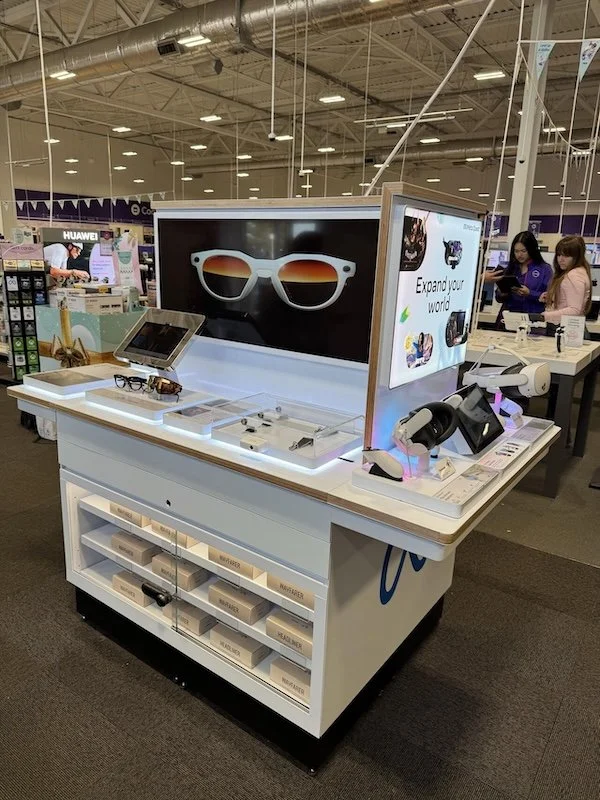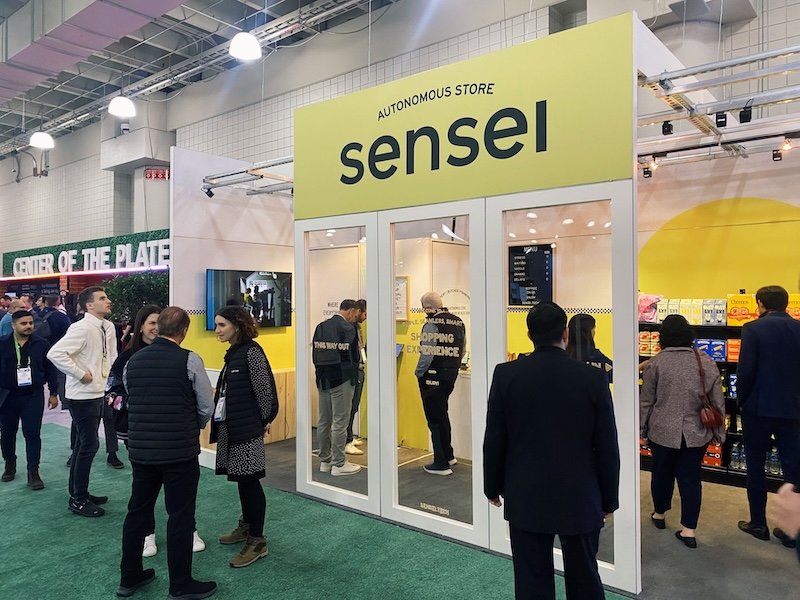Currys reaps rewards of integrating AI into consumer electronics: RTIH rustles up the retail technology week in numbers
Do you like numbers? Do you like retail systems news? Then this is the article for you. Including Augmodo, Chemist Warehouse, Imperva, Currys, PwC, Quantcast, John Lewis, Asda, M&S, Tink, Royal Mail, Primark, and EE.
1…Royal Mail has launched its first owned parcel locker in the UK, and announced plans to have many thousands more.
"With continued growth in online shopping, it is important that we expand our range of services and become more convenient than we have ever been for our customers," says Jack Clarkson, Group Strategy & Transformation Director at Royal Mail owner IDS.
"Customers will now have 24/7 access to drop off and collect their parcels, and can even print their parcel labels at the locker itself. We're always open! This is great news for online shoppers, small businesses and the UK public in general."
£3.9 billion...Currys’ half-year revenue grew 2% to £3.9 billion, ignoring currency impacts. Underlying operating profit rose 52% to £41 million.
Aarin Chiekrie, Equity Analyst, Hargreaves Lansdown, says: “Compared to recent history, Currys had an electric start to the year, with both first-half revenue and profit moving higher. While 2% revenue growth isn’t breakneck speed by any stretch, declines in the Nordics mask 6% growth in the UK and Ireland, as both Online and Store channels charged higher. The positive momentum and continued recovery indicate a potential easing market headwinds and there’s now cautious optimism for the future."
"Market share gains in both major regions are to be applauded. The focus on margins is beginning to bear fruit, with profits jumping higher, albeit from a very low base. Services like device repair, insurance and cloud backup have been a major help on this front as they’re typically higher margin activities. They also bring a little more revenue visibility to a business model that remains at the mercy of ups and downs in consumer sentiment and one-off purchases of big-ticket items like laptops, TV’s and white goods."
"Then there are potential tailwinds outside of Curry’s control. The integration of artificial intelligence into consumer electronics may herald the beginning of an upgrade cycle. So far, this is playing out well, but the first-half numbers only run to late October. The real litmus test will be the next set of results, which will highlight demand over the all-important Christmas period."
"While shoots of growth have emerged in the UK and Ireland, performance in the Nordics region remains a real thorn in the group’s side. Curry’s is doing about as well as it can here in a tough consumer environment here, keeping on top of costs and even edging market share gains without racing to the bottom in a price war. But the Nordic market is in a trough, and the timing of a recovery is out of Curry's control. Until that occurs, markets are unlikely to get too excited.”
4...Augmodo has launched pilots in four Chemist Warehouse locations in Australia.
This involves wearable tech that recommends actions and tasks to increase efficiencies, including restocking shelves, placing orders and improving compliance.
“Every day in each store, our hardworking associates spend hours auditing and working tirelessly to keep products on the shelf,” says Mark Finocchiaro, Managing Partner, CIO & Director at Chemist Warehouse.
“With Augmodo, the AI assistant lets them know which products are out of stock and in the wrong place, and which tasks are needed next. They simply wear the lanyards around their neck and no longer need to spend hours auditing - everything is automatically scanned as they walk the floor, making their role even more valuable. Not only are they helping to provide real-time inventory data, but now have more time to help customers.”
SpatialView is Augmodo’s analytics platform for retail executives and brand partners, which provides real-time visibility into shelf conditions.
“Retailers lose $1.75 trillion in revenue worldwide due to out-of-stocks, preventable returns and overstocks,” says Ross Finman, Founder and CEO at Augmodo. “Our innovative tech helps cut down a good amount of this lost revenue. With better tools, data and insight, we’re working with Chemist Warehouse to decrease data disconnects and make the shopping experience even better for their customers.”
71%…Much like the villain in Dr Suess’s classic tail, The Grinch, research from Imperva shows that 71% of UK consumers believe bad bots are ruining Christmas by snapping up all the most wanted presents.
Two-fifths have been thwarted when trying to buy a gift in the past, only to find that it was completely sold out. As a result:
19% have had to buy a more expensive alternative
13% purchased a gift that wasn't as meaningful
10% had to buy from a secondary marketplace at an inflated price
10% disappointed a loved one by buying an alternative gift
Imperva, which surveyed 2,000 Brits, is warning that ‘scalping’, a practice whereby cybercriminals use bots to buy items from online retailers and sell them for a profit on resale sites, is only set to get worse this Christmas.
60%...This festive season, many cost and climate conscious consumers are choosing to invest in higher quality goods, even if that means purchasing fewer items overall. That’s according to research of more than 2,000 UK consumers and over 500 UK high end merchants conducted by Tink, a payment services and Open Banking platform.
60% of consumers would rather opt for higher quality but fewer items, rather than many lower quality items. Additionally, 43% of those surveyed who shop for high ticket and luxury goods say they are doing so more frequently now compared to this time last year.
This trend is giving high end merchants cause for cautious optimism, with 75% of people expecting to maintain or improve profit margins over the festive period compared to last year.
Shoppers’ focus on quality is reflected in their festive spending, as 37% say they would rather give fewer but nicer gifts to family and friends this festive season, and 40% would rather receive one nice, quality gift than several cheaper items.
However, high end merchants cannot afford to rest on their laurels this festive season, as Tink’s research also suggests a shift to ‘conscious consumerism’ is leading shoppers to be more cautious and considered when buying higher end items.
32%...Research from AdTech firm, Quantcast, shows John Lewis' latest Christmas ad, The Gifting Hour, helped increase the retailer's UK addressable audience by 32% in November 2024, compared to the benchmark taken in September this year.
Asda’s The Gnomes of Christmas ad came in a close second, with an increase of 27%, while the M&S offering, which sees a young girl bring her family together using a magic snow globe, resulted in a 26% increase.
With Advertising Association and WARC data estimating ad spend will reach £10.5 billion this holiday season, UK supermarkets will be pleased to see their campaigns have already caused a significant increase in brand exposure across the open internet.
£22.7 billion...Spending on gifts and celebrations this Christmas is expected to reach £22.7 billion in the UK, marking a 5% increase from £21.6 billion last year, according to research from PwC.
Average spending per consumer is projected to rise from £416 to £433. These figures surpass the levels seen over the past two years and are comparable with the first post-pandemic festive season in 2021, when total spending hit £21.6 billion, with an average of £426 per person.
Younger consumers are leading the charge here, with 29% of 18-24-year-olds planning to splash out more than last year, followed closely by 25% of those aged 35-44. However, it’s the 45-54 age group that takes the top spot as the biggest spenders, with an estimated average of £463 per person.
The research highlights the reasons behind the rebound in Christmas spending after three challenging years. Financial pressures, which heavily influenced consumer behaviour in 2022 and 2023, have eased significantly in 2024.
Notably, the proportion of people citing "less money to spend" has dropped from 54% in 2022 to 37% in 2024, while those pointing to "negative personal finances" decreased from 57% to 32%, signalling improved confidence heading into the festive season.
£300,000…FIGR Ventures, a newly established family office fund, has announced its first portfolio investment into TRUSS, a UK-based tech startup powering fashion resale with AI enabled data infrastructure.
TRUSS was founded by Warwick University graduates Woody Lello (CEO), Felix Jackson (COO), Jack Cardwell (CIO) and Connor Mattinson (CTO).
Officially launched in 2022, it creates millions of product profiles which contain detailed information about any product. Using only a photo, businesses can tap into this information to list products efficiently, enhance searchability and improve conversion rates.
With the new £300,000 investment from FIGR, TRUSS has secured critical match funding to activate a £1.1 million Innovate UK grant. This funding supports a collaborative project with the University of Warwick, Depop and Selfridges to develop a bespoke algorithm that can instantly recognise a fashion item from TRUSS’ database using a single image.
4…Primark last week opened four stores in four different countries on the same day, a first for the budget retailer.
The move represents an investment of over €45 million from the business, creating 580 new jobs and adding 130,000 sq. ft. of selling space to its global footprint.
Stores as follows:
Parque Sur, Madrid, Spain
Tours, France
Glasgow Fort, UK
NYC Queens Center, US
In a LinkedIn post, Dan Butcher, Programme Manager at Primark, said: “Three of these stores had technology delivered by my team - with the US delivery by Toby Rainbow.”
“Amazing job Mark Thorpe (Retail Project Manager), Paul Melville (Technology Implementation Project Manager), and John Agudelo (Technology Stores Implementation Manager Iberia). Your cool heads, commitment and charm you all displayed this week is what makes this team a privilege to be part of.”
31,000…UK-based online marketplace OnBuy says that it has gained more than 31,000 new VIP customers in just two weeks thanks to the launch of its loyalty programme.
It released its new VIP initiative on 22nd November, providing a way for returning customers to claim double the cashback rewards.
This means savings for consumers on everything from household essentials to luxury items. VIP customers earn a minimum of 2% cashback on everything they buy, including discounted products, and can save even more with double cashback deals delivering rates from 5% up to 30%, immediately credited to their OnBuy account when they complete their purchase.
This can be spent onsite immediately, saved, or withdrawn to their bank account after 30 days once they have a balance of £5 or more.
$200 million…Katherine Homuth, Founder, CEO and Chair at SRTX, whose brands include Sheertex, producer of rip resistant tights that made a fan out of Taylor Swift, has taken to social media to tell the warts and all story of her Montreal-based textile firm.
Homuth recently raised $200 million and counts fashion icon Chip Wilson, Swedish retail giant H&M Group, and clean technology venture capitalists, among her investors.
But, as is the case with many high profile startups, the company isn’t profitable, leading to countless sleepless nights and a journey that is by turns exhausting, terrifying and hugely fulfilling.
In a LinkedIn post, she said: “I’ve been holding back online for years. Why? Honestly, I was afraid. Afraid of being called out, taken down, or judged by strangers on the internet. (Who isn’t?) But here’s the thing when you’re fighting for something that truly matters, fear has no place. So today, I’m ripping off the Band-Aid and telling you the real story of Sheertex.”
“Here’s the truth: Sheertex isn’t profitable. Not even close. We lose millions every year. I’ve cried more tears over this company than I’d care to admit. But we’ve also raised $250 million, built one of the most advanced textile factories in North America, and proven there’s demand for a game-changing product.”
“Our tights once cost over $100 each to make. Today, they cost $13. By next year, they’ll cost $5. But we’re still fighting tooth and nail to survive.”
31…EE has announced the opening of its latest Experience store, situated in Norwich’s Chantry Place shopping centre.
“It’s been a huge year for us on the high street, and we’re closing it out with one more big opening,” says Asif Aziz, Retail Director at EE.
“This is our 31st EE Experience store to launch since we announced our revamped retail strategy last summer, and I could not be prouder of the entire retail team for their dedication to delivering the best customer experience and giving customers the chance to get their hands on the latest connected technology.”
“Good luck to everyone in Norwich, and thank you for all your efforts to make opening the doors at one more Experience store this year happen. More to look forward to next year.”
The store has been designed to help people explore the latest in connected technology and forms part of EE’s investment of £6 million+ in bricks and mortar retail this year.
It features Experience Zones themed around four key areas – Game, Work, Learn, and Home – along with a Tech Home area showcasing the future of connected living.

































Continue reading…